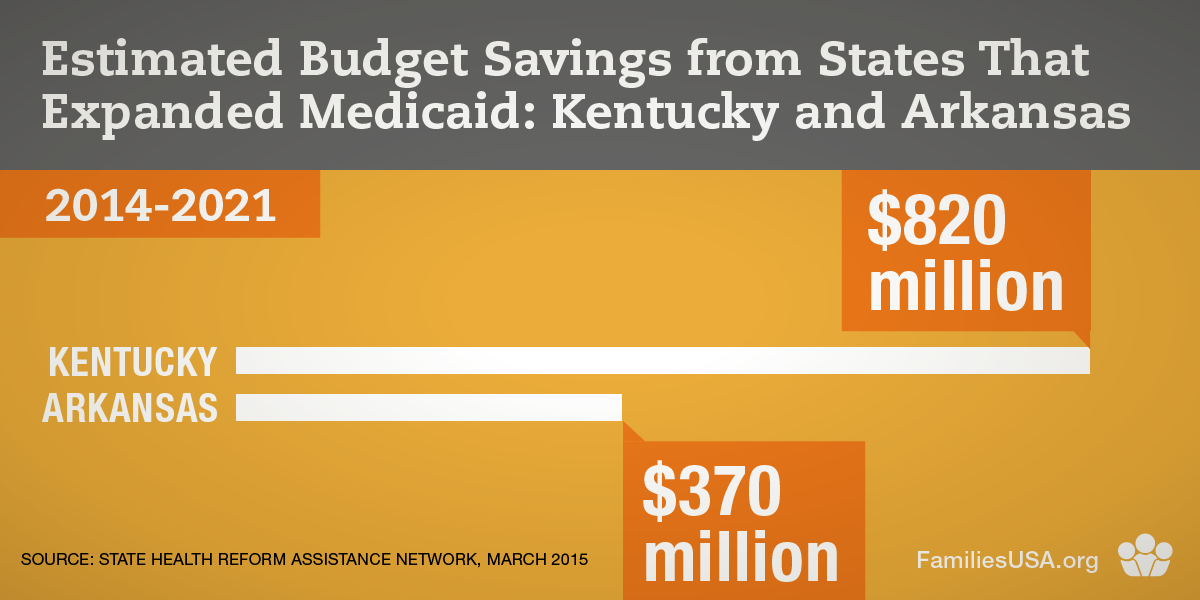
Medicaid Expansion States See Financial Savings and Health Care Jobs Growth
By
03.24.2015
States that have expanded Medicaid under the Affordable Care Act are seeing major budget savings, according to reports released in the past month. These budget savings coupled with new data linking Medicaid expansion to job growth in the health care sector add to the reasons why the program makes good sense for states.
New Jersey sees 43 percent drop in uncompensated care
The latest governor to tout the benefits of expansion is New Jersey’s Gov. Chris Christie, who factored the savings in his 2016 state budget proposal. Bloomberg Politics reported that Christie, during town hall meetings across the state, talked about the benefit to state hospitals and a 43 percent drop in uncompensated care cases.
Arkansas predicts $370 million in savings through fiscal year 2021
Kentucky and Arkansas are also reporting significant savings. A March 4 issue brief by Manatt Health Solutions for the State Health Reform Assistance Network indicates “significant budget savings and revenue gains” in both states. The brief notes Kentucky is estimating $820 million in savings fiscal years 2014 to 2021, while Arkansas predicts savings of $370 million through the same period.

“These early savings point to Medicaid expansion paying for itself at least through fiscal year 2021—while generating major gains in coverage and reducing the number of uninsured,” the brief notes.
The brief also indicates that “many other states are beginning to report comparable economic information” and “all states are finding additional benefits ranging from significant drops in the number of uninsured to a reduction in uncompensated care costs to the creation of tens of thousands of jobs.”
Arkansas benefitted from the 100 percent federal match for adults who were previously enrolled in waiver programs or other eligibility groups and who could now be covered under the expansion program, according to the brief. This resulted in savings of $17.5 million in 2014.
The state also gained from assessments and fees on providers and health plans to the tune of $4.7 million in 2014. These revenues are expected to grow to $29.7 million in fiscal 2015.
Kentucky savings found in state budget and in uncompensated care
The Commonwealth of Kentucky identified the savings in the first year of expansion in a report prepared by Deloitte Consulting LLP. State budget reductions were found because some programs funded with state dollars could be covered under Medicaid following expansion.
For example, the Kentucky Department of Corrections budget included a $5.4 million reduction in fiscal year 2014 that grew to an $11 million reduction in both fiscal years 2015 and 2016. That reduction is the result of savings in the coverage for prisoners’ medical treatments. The Department of Public Health and the Department of Behavioral Health, Developmental, and Intellectual Disabilities saw savings, as well. Total savings for all three departments in the fiscal year 2015 budget were set at $38 million.
In addition to the savings in the state budget, the Kentucky report estimated that hospitals experienced a reduction of $1.15 billion in uncompensated care charges comparing the first three quarters of 2013 to the same period in 2014.
Medicaid expansion states experience more job growth in health care sector
In addition to budget savings, Medicaid expansion states are seeing more jobs in the health sector. An article by Fitch Rating found that states that expanded Medicaid “have seen substantially faster growth in healthcare jobs than those that did not since the first expansions began last January.”
Fitch cited data from the Bureau of Labor Statistics showing health care and social services jobs grew more than 30 percent faster between December 2013 and December 2014 in the states that expanded Medicaid on January 1, 2014 than in those that did not. On average the expansion states saw jobs grow by 2.4 percent compared to the previous year, while those that did not expand grew at 1.8 percent.
The article also noted the potential impact for expansion states on budgets and hospitals:
A number of the 22 states that have not expanded Medicaid face budget shortfalls in the current legislative sessions. The opportunity to provide coverage for the uninsured will help these states save both dollars and lives now. The alternative—not expanding—means fewer jobs, budget cuts, and higher taxes. States should consider the bottom line of their budgets as well as health of their citizens while deciding whether to pursue Medicaid expansion.
